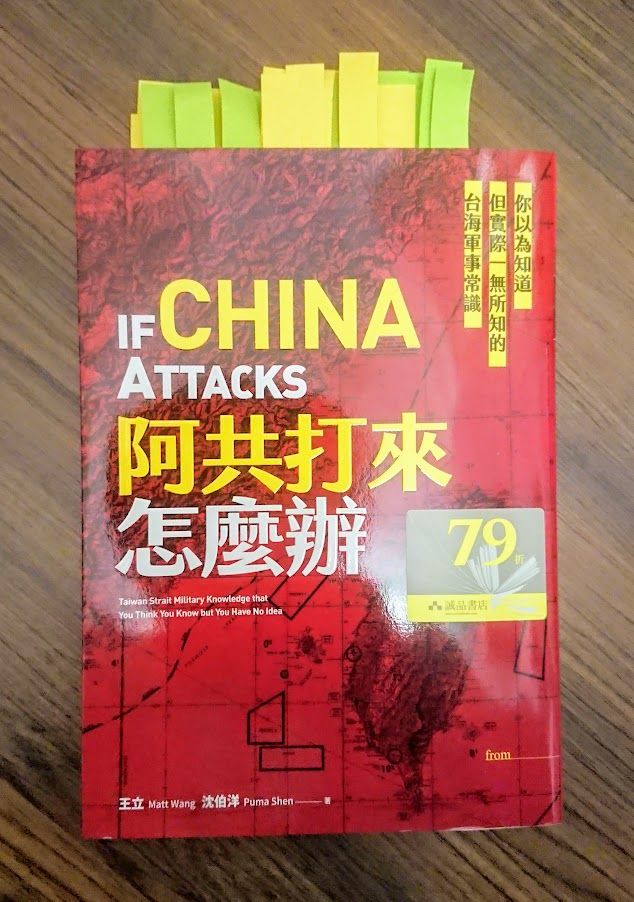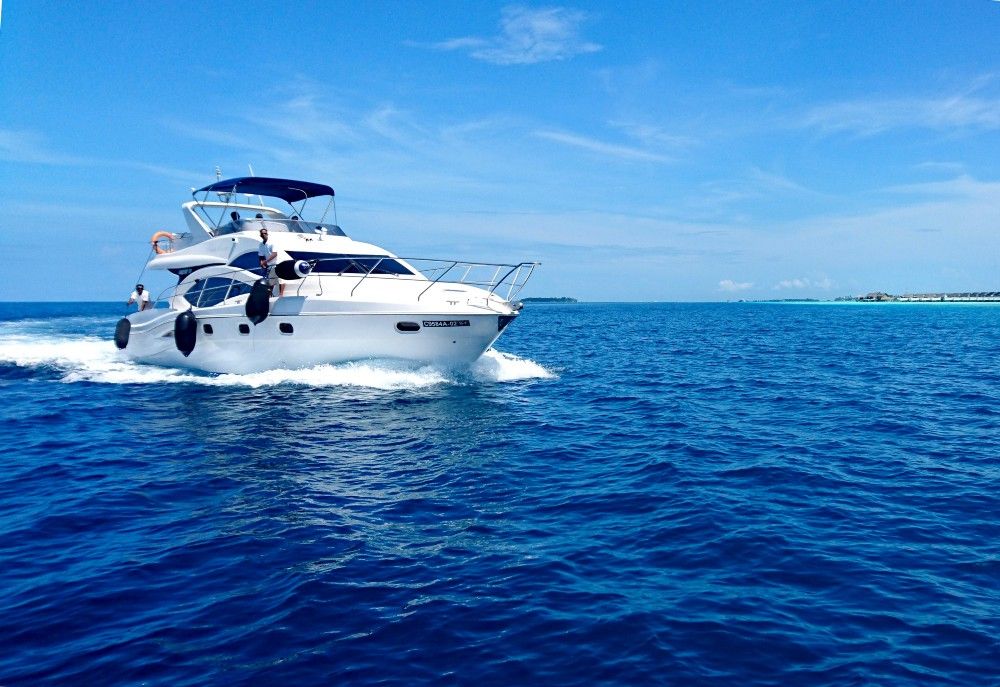
半導體外商的小小螺絲釘,遊走於廢青與社畜之間。熱愛閱讀,喜歡透過書本探索外在、內化自我。希望藉由書寫打開與世界交流的一扇窗。 個人部落格:https://maxjamesread.com/
"What if the CCP Calls": Military rumors in the Taiwan Strait that we have heard in those years!

It has been more than two months since Russia invaded Ukraine, and the fighting has not stopped. Living in Taiwan, which also has an evil neighbor, I wonder if you have also thought about this question: What if the ACCP calls ? Let this "What to Do When the Communist Party Calls" will tell you!
The author, Wang Li, is the moderator of " Wang Li's Second War Research Institute" on Facebook. He also has a column on the square grid. He has long been devoted to telling everyone about military knowledge that is unfamiliar to the general public in a simple and easy-to-understand way.
The following three parts will introduce this book. The first part will talk about three common rumors about the CCP’s invasion of Taiwan, and solve their contradictions respectively; the second part will analyze the 5 steps that the CCP will actually take if it really wants to invade Taiwan; the third part will talk about the CCP’s ongoing campaign against Taiwan The alternative warfare being waged: Information warfare.
[1. Crack the common rumors of attacking Taiwan]
The book cites ten common military rumors about the CCP's attack on Taiwan, and deciphers them one by one. Here I will pick three that I often hear and share with you.
[1. Ballistic Missile Invincibility Theory]
The first is the so-called missile washing theory. To put it simply, the CCP’s missiles are numerous and of high quality, and as soon as a war begins, they can destroy Taiwan’s air force bases, air defense positions, government agencies, and even airports and power plants. Taiwan loses its ability to resist at the click of a finger, and can only be slaughtered by the PLA, which occupies land, sea and air superiority.
So what's the biggest problem with this rumor? Very simple: the quality and quantity of the CCP's missiles are insufficient .
The book uses simple math to illustrate. China can launch about 500 missiles against Taiwan at a time. Assuming that the launch rate is "100%", to hit all important targets such as air force bases, naval ports, main army bases, and the presidential palace, each target can only be allocated a maximum of 7.46 missiles.
Even if the accuracy of the missiles is set at 50 meters and the damage radius is 25 meters, at least two to three times the number of missiles is required to paralyze the military advantage of our air force. The Dongfeng-15 tactical ballistic missile, which has the largest number in China, has an accuracy error of 300-600 meters. Not to mention that even if it can be hit, its destructive power will hardly completely make the target lose all functions. In other words, in order to achieve the above-mentioned "destroy" effect, more missiles are actually required.
To put it simply, unless the Chinese missiles are set to be super accurate and destructive, like adjusting the game parameters, they can kill with one hit. Otherwise, the CCP's missile capability is not enough to pose a threat to Taiwan.
- Further reading: The popularization of military knowledge in the Taiwan Strait ─ and some military rumors we have heard (2)

(2. Theory of Ten Thousand Ships Attacking Taiwan)
The tactical attack by a sea of people is another classic rumor. At first glance, it makes sense. After all, China's military is far superior to Taiwan. As long as the army crosses the sea, it will only be a matter of time before Taiwan is overwhelmed by human sea tactics. Among them, the most common saying is that "all ships will be sent together" to enter Taiwan. The content refers to the CCP levying thousands of fishing boats to transport a large number of PLA troops ashore, using the advantage of the number of people to break the bend.
The problem is that it is not so simple for the PLA to cross the sea from China to Taiwan .
First of all, the coastal terrain of Fujian and Zhejiang is almost difficult to station in the fjords of the army, and there are only roads near the fishing port to transport soldiers. That is to say, it is very difficult to gather millions of troops at the same time and transport them on board quickly.
Furthermore, the Taiwan Strait is known as the black water ditch, and the wind and waves are no joke. To ask the communist army to take a fishing boat to attack Taiwan is to abuse the soldiers. Even if they arrive in Taiwan smoothly, I am afraid that they will already be dizzy and vomit, and it will be difficult to fight.
In addition, due to the limited carrying capacity of fishing boats, only light vehicles and soldiers can be boarded. Coupled with the extremely poor defense of civilian ships, Taiwan's armored and air cavalry units are simply hitting stones with eggs.
Even if it is possible to break through all difficulties and land, the follow-up attack will be extremely difficult. There are not many landing points in Taiwan that can grab the beach, and the width is only a few hundred meters. As long as the People's Liberation Army landed, before the next wave of military strength was replenished, it had to face high-density heavy machine guns and artillery attacks alone. To a certain extent, it was no different from dying.
In short, there are too many impossibility in the operation of the theory of thousands of ships, so don't take it too seriously.
- Extended reading: The popularization of military knowledge in the Taiwan Strait ─ and some military rumors we have heard (6)

[3. Blockade of Taiwan Theory]
Finally, let's talk about the "blockade theory" that is also very popular. This argument is that China can easily seal off the small island of Taiwan. In addition, other countries will just stand by and watch, and Taiwan will be finished within a few days.
Wang Li said that rumors must be partly true. In fact, China does have the ability to block Taiwan, and Taiwan cannot stand the blockade for too long.
But realistically, a strong blockade is not feasible .
Taiwan is an island, and the navy and air force must be used to block it. The problem is, the sea is vast, and it is easier said than done to check them one by one. Unless you don't ask black and white, if you see a ship that seems to be heading for Taiwan, it will be sunk. Otherwise, all the ships of all countries around Taiwan will be checked, and the number of the Chinese navy will not be enough. What's more, why did the merchant ship obediently ask you to check?
In short, being able to blockade and actually being able to do it are two different things.
- Extended reading: The popularization of military knowledge in the Taiwan Strait ─ and some military rumors we have heard (3)

From the above explanation, it can be found that the PLA's attack on Taiwan is not as easy as these rumors.
The probability of China's military invasion of Taiwan is not high, and the success of military reunification is almost nonsense. The reasoning behind this is not blind faith, but science.
Wang Li bluntly said that the great thing about rumors is that they have some truths, and often make people who don't know why believe that other parts are also true. But on the other hand, it is precisely because of the high difficulty, cost, and high cost of a formal military aggression against Taiwan that we want to use rumors to reduce the difficulty of aggression and achieve the effect of "subduing the enemy without fighting."
Rumors are all about turning people into defeatists.
So if the CCP really wants to invade Taiwan, what will it actually do? Let's see.
[2. The real script of the CCP's attack on Taiwan]
After talking about the common rumors of attacking Taiwan. Then, if the CCP really wants to invade Taiwan, how will it plan its actions? It can be roughly divided into 5 stages:
- pre-war preparations
The army is assembled, and the navy and air force are ready to be dispatched. - In the early days of the war, <br class="smart"> used ballistic missiles to strike Taiwan's air defense and anti-ship weapons energy, preparing for the battle for sea and air power.
- Air and sea dominance
Dispatch the sea and air force for control of sea and air. - Landing attack stage
After obtaining certain sea and air rights, the army will attempt to land. Seize stalls and ports. - After establishing a beachhead, move to the military and political powerhouse
After capturing the port and establishing a mechanism for transporting the People's Liberation Army, attack the military and political areas.
It can be seen from the above steps that if the CCP wants to invade Taiwan, it must go through layers of steps and gradually advance in order to achieve it. It is by no means as simple as a triumphant return in three or two days. Even the problems to be faced at each stage are enormous.
For example, the preparation time should not exceed three months at most, otherwise Taiwan will have the opportunity to prepare; the accuracy and power of the PLA's ballistic missiles are insufficient, and it is difficult to effectively attack the air defense energy of the national army in Taiwan, which makes the landing extremely difficult; even if the landing is successful, Logistical supplies can’t keep up, and there is a high possibility that there will be a shortage of food, ammunition, and even water.
The book has a detailed explanation of the practical methods of each stage and the problems encountered. At the same time, it also gives the direction that Taiwan needs to strengthen accordingly. Highly recommend everyone to read it. Wang Li firmly believes that there is only one situation in which Taiwan will lose:
A group of people who were scared to death and wanted to surrender elected a president who really wanted to surrender immediately, and a legislature who wanted to surrender. So when the PLA went ashore, they cried in fear and wanted to admit defeat.
With Taiwan's strong sense of resistance to the enemy, the probability of the PLA's success in attacking Taiwan is quite low.
[3. Ongoing War: Information War]
Since it is quite difficult for the CCP to invade Taiwan by force, can we rest easy?
Wang Li emphasized that the fact that the CCP does not invade Taiwan is not because it does not want to, but simply because of its lack of ability. Since it is difficult to be hard on the front, the CCP will move forward in a roundabout way, which is the theme of this paragraph: information warfare .
I believe that after years of baptism, everyone should be familiar with the term information warfare. For example, in 2016, Russia infiltrated through the cyber army and successfully influenced the US presidential election. In addition, similar methods are used in Ukraine and the three small Baltic countries and other places, and the effect is quite good.
China, on the other hand, learned from Russia's experience and set Taiwan as an experimental site for information warfare. In Taiwan's elections over the past few years, the "red" footprint has been seen systematically operating. China's system to Taiwan can be roughly divided into 6 parts:
- Ministry of Homeland Security
- Taiwan Affairs Office
- PLA system
- United Front Work Department
- Central Propaganda Department
- Communist Youth League
The following figure briefly analyzes the relevant levels and action lines of each ministry:

As for the dissemination mode of information warfare, Wang Li believes that it can be roughly divided into three types:
- information flow
- Use fake news, elder pictures and other content to spread through nodes to attract a large number of viewers, thereby "circling fans".
- cash flow
- Through investment outsourcing, disseminate information in a conspiracy theory and story-like manner in secret fan clubs or Line groups.
- flow of people
- Through specific fake news, the relevant team members are brainwashed to build their beliefs. Let these people carry out relevant online publicity in the form of volunteers.
As a while ago, the reporter used the article " Neo-Nazis, U.S. Abandoned Sons, and a Family on Both Sides of the Strait: Dismantling Taiwan's Influxed Russian-Ukrainian War Trends and Manipulation ". ” and other remarks, how was the planned real estate system spread to Taiwan.
If you want to know more about the topic of information warfare, I highly recommend the book "Truth Making". The author Liu Zhixin spent five years searching for the crisis of information warfare that countries are currently facing, which is quite profound and exciting.
- Further reading: "Making the Truth": The information war begins, you and I are already in the smoke!
【Summarize】
in conclusion. First of all, we introduced three common rumors about the CCP's invasion of Taiwan: the theory of invincible ballistic missiles, the theory of ten thousand ships attacking Taiwan, and the theory of blocking Taiwan, and explained its blind spots; then, we described the 5 steps of the PLA's attack on Taiwan, and explained why they attacked Taiwan. It is almost impossible to succeed; finally, it touches on how the CCP’s current mode of warfare: information warfare, works.
【postscript】
I have read Wang Li's articles intermittently before, so I was very interested in this book as soon as it was released. I want to say that I can finally increase my knowledge of the Taiwan Strait war in a one-time and systematic manner.
To be honest, I didn't care much about the issue of the CCP's attack on Taiwan in the past. Due to work, I have traveled to China many times before the epidemic, and I have stepped on it in first-, second- and third-tier cities. I always feel that the CCP is already incapable of dealing with a society riddled with holes and contradictions, and it has no time to fight Taiwan. However, the recent exchange of fire between Russia and Ukraine seems to indicate that anything is possible. After all, the thinking mode of dictatorship countries is really difficult to understand.
Due to the outbreak of the war, I spent a lot of time on the military version of Kick and Kick. I have seen some readers comment on this book as "too redundant", spending a lot of time explaining military rumors that are impossible to practice. But for a "military blind" like me, it's actually very helpful.
In the past, I used to hear friends around me mention the crimes against Taiwan in the book, and I didn't think there was anything wrong with it at the time. In other words, these rumors may be too lazy for professionals to refute, but very convincing to the general public. After all, military martial arts is a very professional field, and it is difficult for the general public to step into it.
Wang Li once said in his introduction that Taiwanese people, no matter where they are on the political spectrum, lack military common sense:
Whether it is the belief that the People's Liberation Army is invincible and that Taiwan has no chance of winning, it is better to give up its armaments; or it is the other way around that Taiwan is sure to win, so buying weapons indiscriminately is not bad. Both of these ideas will create obstacles to national security.
Like before I read this book, I also tried to tell myself to keep thinking critically and ponder the content of the book. But soon found that interlaced such as mountains. Although the statements in the book are very convincing to me, I am not sure if there are any doubts in them. But perhaps as Dr. Lin Yingyou said in the recommendation preface:
If this book can arouse more people's attention and thinking on national defense and military issues, and even conduct in-depth research on the issues discussed, this may be a major contribution of this book.
If you are interested, you can also read more articles on the military edition. It is very interesting how the Kanban friends analyze the war from the perspective of weapons, strategy or international games.
Finally, to quote Churchill's famous words:
In the face of war and humiliation, you chose humiliation! However, after the humiliation, you still have to face the war!
Nobody wants war to happen. After all, behind the fascinating weapons and strategic knowledge, every human life is sacrificed. But if war is an issue that must be faced by Taiwanese, then it must be understood. I believe this book will be a good start.

Like my work?
Don't forget to support or like, so I know you are with me..
Comment…